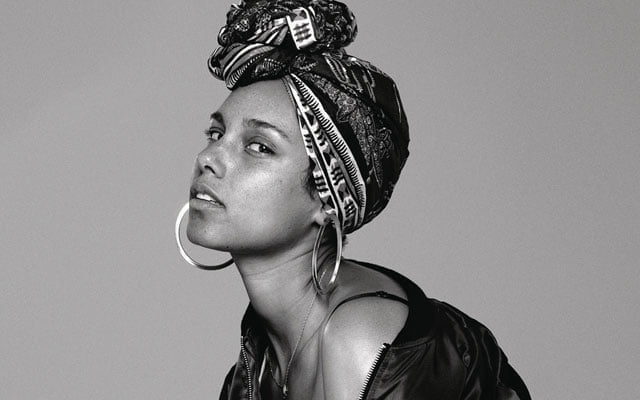
Alicia Keys
The multi Grammy Award-winning artist met the podcasters to discuss her forthcoming sixth studio album and her approach to songwriting
For their 90th podcast our friends at Sodajerker spoke with a global megastar and a songwriter who has won 15 Grammy Awards and sold over 35 million albums and 30 million singles worldwide. Not that anyone’s counting, of course.
Alicia Keys was born in the Hell’s Kitchen area of Manhattan, in New York City in 1981. The daughter of a flight attendant father and a paralegal and part-time actress mother, Keys began studying classical piano at age seven. She enrolled in the Professional Performing Arts School at the age of 12, graduating as valedictorian at the age of 16.
Despite meeting her long-term manager Jeff Robinson in 1994 and A&R at Arista Records, Peter Edge, the following year, it was 2001 and when Keys released her debut album, Songs in A Minor. The record was an enormous success, making it to No 1 on the US Billboard 200 and going on to sell over 12 million copies worldwide. Keys has since released a further four albums: The Diary Of Alicia Keys (2003), As I Am (2007), The Element Of Freedom (2009) and Girl on Fire (2012).
With her sixth studio album due out later this year, Sodajerker caught up with Keys and discovered some of the secrets behind her enormous success…
What’s it like writing in a group as opposed to writing as an individual?
“It’s weird. For so long I wrote alone and maybe had my partner Kerry “Krucial” Brothers, who was a partner of mine for many years, with me. So I was a bit of a lone wolf. What I’ve learned about writing with other people is that it’s about finding that way to unveil yourself and it’s challenging, but when you do that it really brings you somewhere.”
What’s your process for writing?
“It depends. A song like If I Got You happened all at once, really quickly – one sitting, concept. I remember that I wrote it on a plane and then I landed and then I got to my hotel, got the key to my room and then I tried to write out the chords that I had written in my head. Then boom, that was it! But then a song like Diary, I had this piano riff that I was playing for months, with no lyrics, nothing that was relevant or made any sense and then finally I sat down and something came out.”
How do you document the ideas and songs that you’re working on?
“I’m a big ‘voice-noter’, because I forget everything! I’m just more of a ‘viber’, more of an energy person. So I’ll grab my thing and press record, play it back and then say ‘Okay, I’ve got something’. Sometimes it will be lyrics first and sometimes it will be melodies first. I also always have a notebook: I document melodies with my phone but when I’m writing an album I will always write in a book. I love paper and I love pen. People can write on their computers or on their phones, but I don’t feel comfortable that way.”
Girl On Fire was quite a collaborative record.
“It was but in a different way to how my this record [Keys’ upcoming sixth studio album] worked. I think at that time I was really searching for my independence and I wanted to see what would happen when I collaborated with anybody on planet earth that I wanted to. And that was good, it really brought about such interesting pieces of work and it was really fun to do. Because for so long I worked with one main collaborator and we had a really great connection and it gave me so much of the body of work that I have. Then you start to want to try something else and you think “what happens when I try something totally different?”
You’ve been writing since such a young age.
“Yes, I wrote my first song when I was 11. But I guess that when I really got some ideas about how I should go about writing songs I was probably 14. I started playing piano at 7 and that was great, it was really good to learn. But I hated it, it made me so angry and upset because you had to practice so much! You know, it’s summer and you can hear everybody outside playing and you’re inside learning how to play piano.”
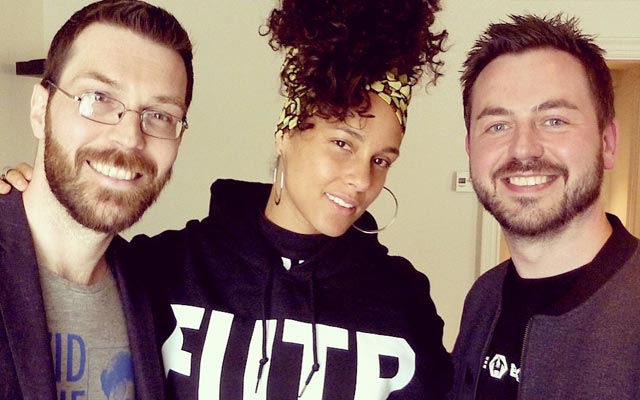
When Brian and Simon of Sodajerker met Alicia
And you had classical piano training?
“Yeah classical was exactly what I studied. I studied the Suzuki method, which is this Japanese classical style of learning. I had all of the great classical composers in my training. Then later on I would do pieces of four movements and perform them at recitals. It was great!”
Are you quite a technical musician as a result of your musical background, or are you more instinctive?
“A mixture now. I would say that I definitely have the technical capabilities and background and knowledge, but I’ve also learnt how to bring in the non-technical, emotional side too. There’s a real balance there and I always admire people who can totally just sit down, like Stevie Wonder, and that everything is something that you’ve never heard before. Because that’s such a beautiful way of playing and I always wanted the capacity to be able to play in both ways. I eventually got there but at the beginning it was a very technical style that I played.”
Woman’s Worth and Girlfriend have really interesting melodies, did you spend much time on them and try to make your melodies sound original?
“Woman’s Worth I remember in particular, once the concept dawned on me it kind of just fell out. Some songs do that, they just fall out and because the chorus is leading you, you just follow it and find where it’s going. I feel like Girlfriend was a beautiful complex chord melody that came together, so I remember spending a lot of time on that particular song.”
Empire State Of Mind is one of your smash hits. Tell us how that came about.
“That was just unbelievable.That song was such a monster that we were strategizing putting out my record, because I remember that Eleanor Freedom came right after that, we had to be careful of Empire… because I might crush my new music, my own new music! To this day people still love it and relate it to their dreams and their hopes and their faith and believing in themselves and stuff like that. You just don’t know what’s gonna happen with songs!”
It is it difficult for you to find the time to write?
“I find that I go in different phases. Like I might be very heavily in the creative only phase and I have the space to create and that’s what I’m doing. Then I get into an outward phase where I’m introducing people to what I’ve already created and I find that then the time and effort and energy goes very specifically into that. It’s not that I’m not being creative it’s just that I’m in a different phase. Then I’ll go more into the tour phase, which is a whole other output and that again is not so conducive to writing for me. I will get ideas when I’m not in the creative, incubative, phase, but I find that that is the time when I write the most.”

Internationally renowned songwriters are queuing up to be interviewed by Sodajerker, who now have over 90 episodes under their belt. Established in 2012 by Liverpudlian songwriting duo, Simon Barber and Brian O’Connor, the Sodajerker On Songwriting podcast has welcomed guests including Paul Simon, Ben Watt, Justin Currie, Willy Russell, Lamont Dozier, Neil Sedaka, Johnny Marr, Ben Folds Five, Billy Bragg, Richard M Sherman, Neil Finn, Suzanne Vega, Jimmy Webb, Rufus Wainwright, KT Tunstall, Dan Gillespie Sells and many more.
To find out more about Sodajerker and their work, or to download their podcasts – including the full 40-minute interview with Alicia Keys – go to www.sodajerker.com. You can also connect with them on Facebook or Twitter, or download the podcasts from iTunes.

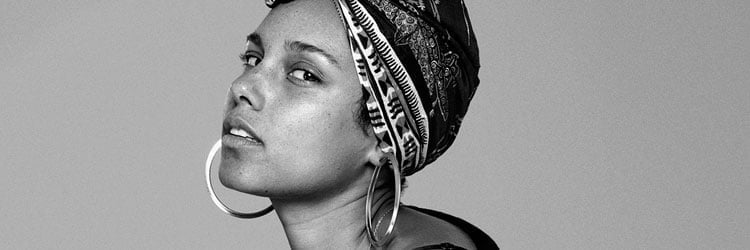
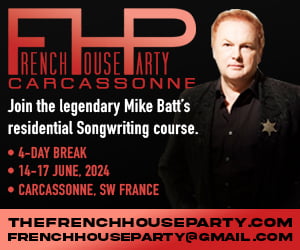





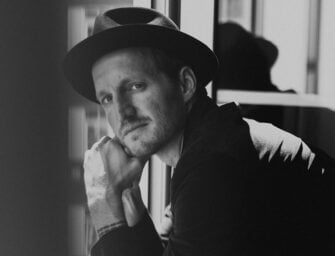

























Related Articles